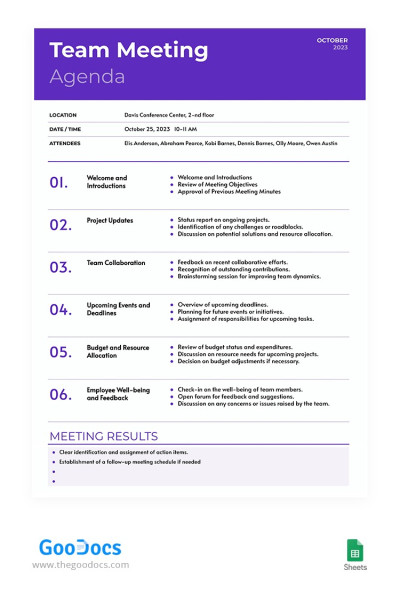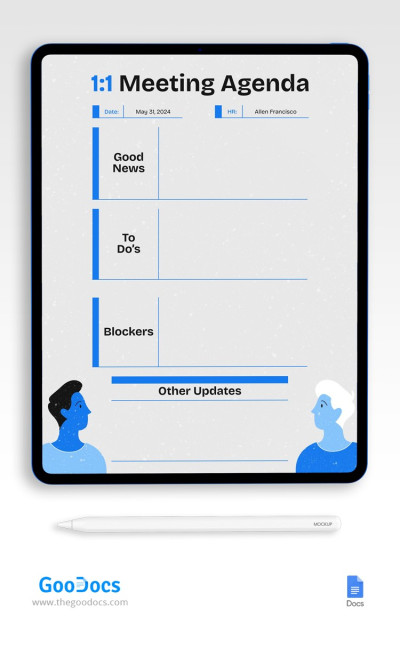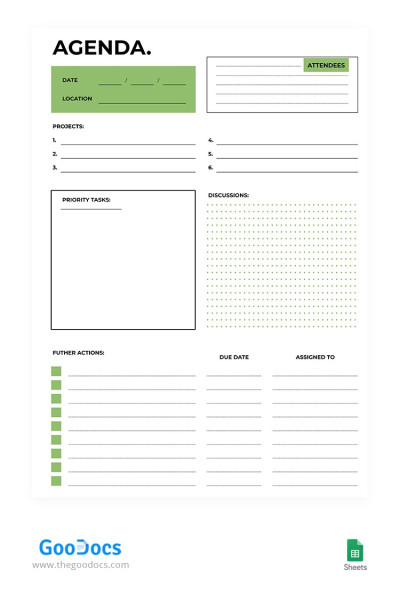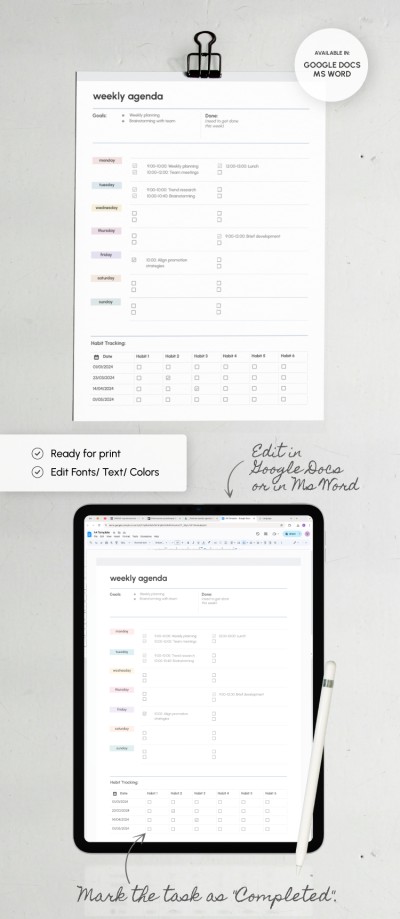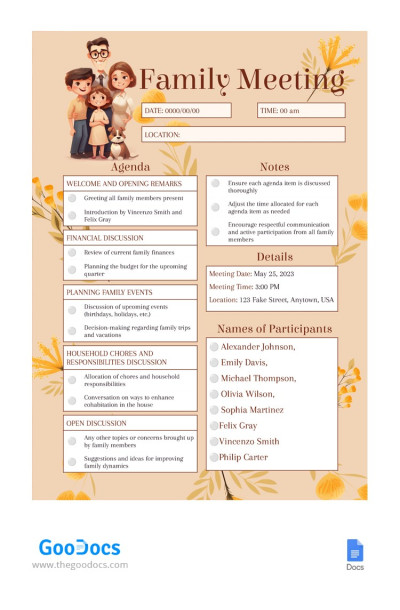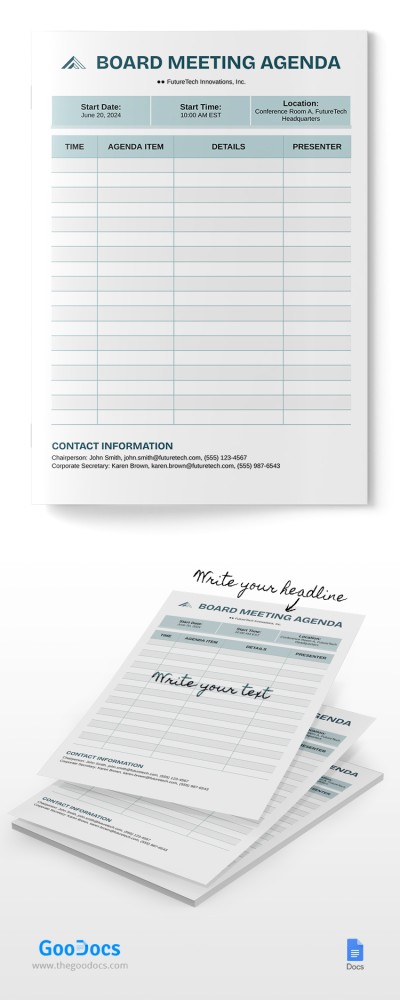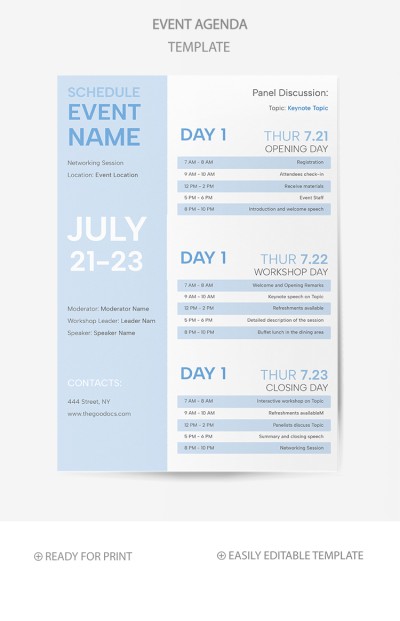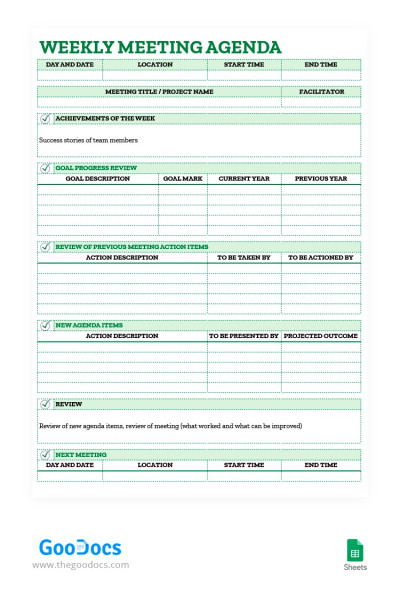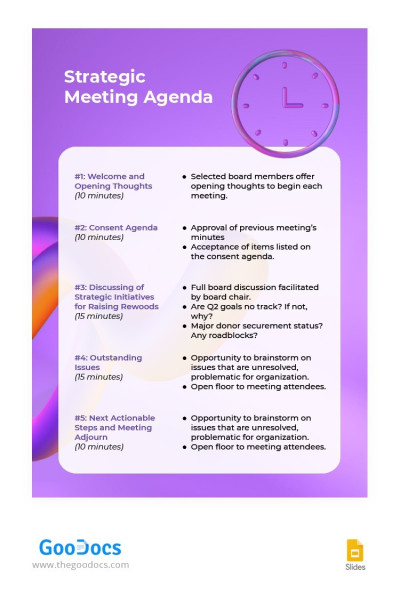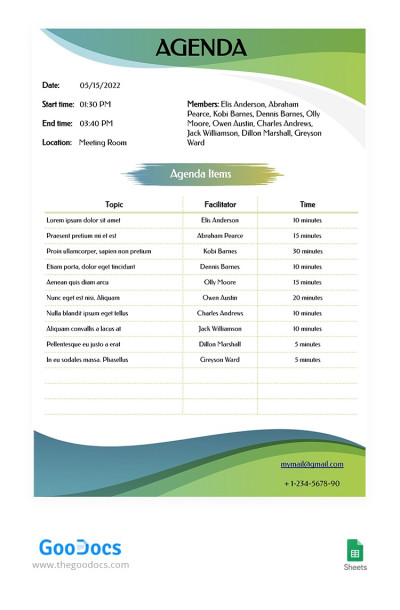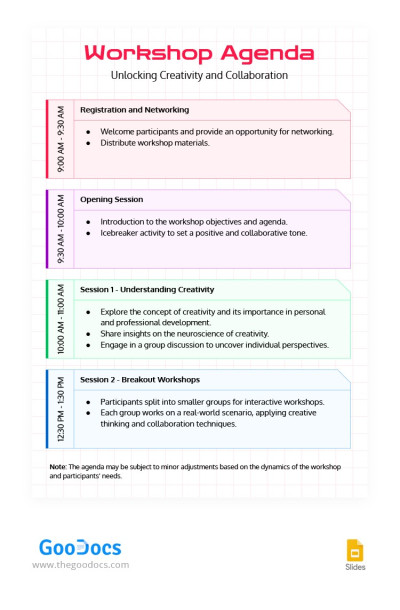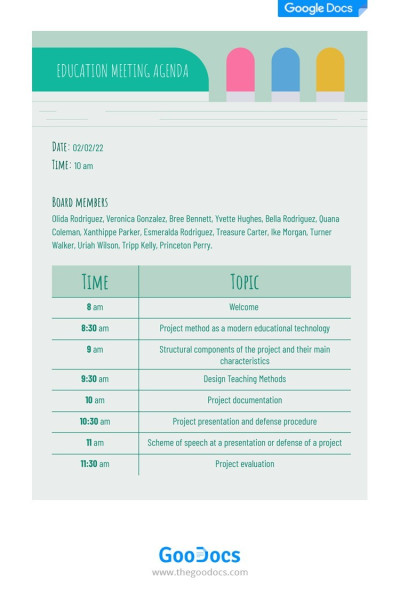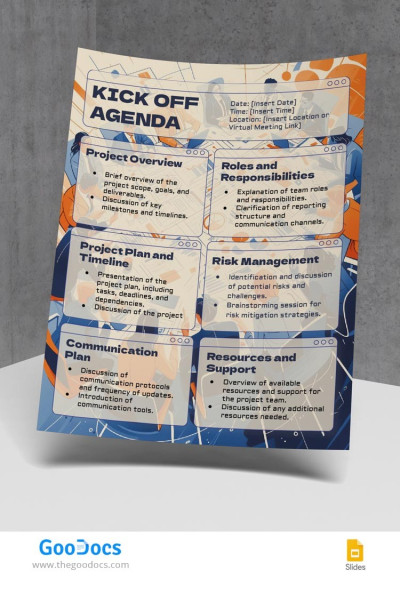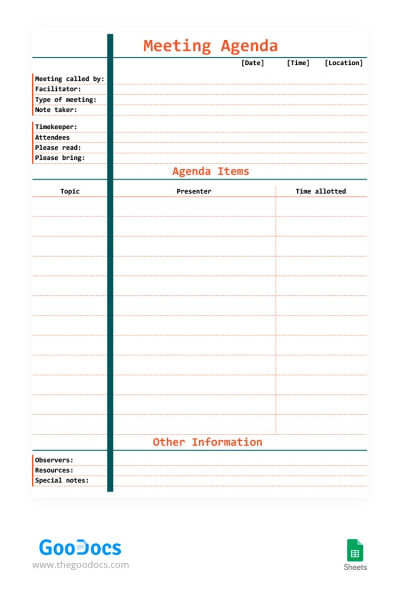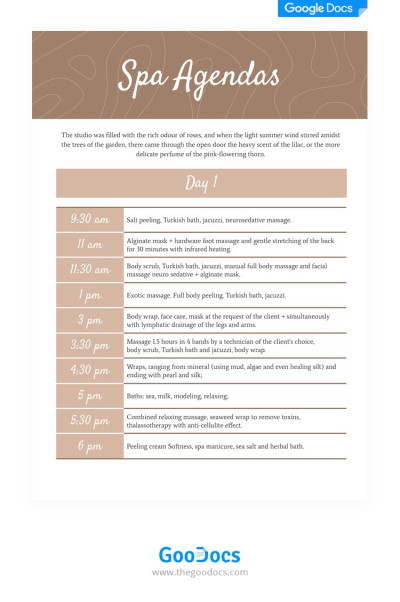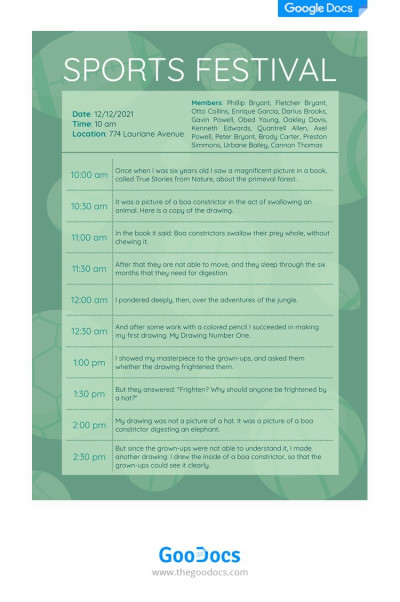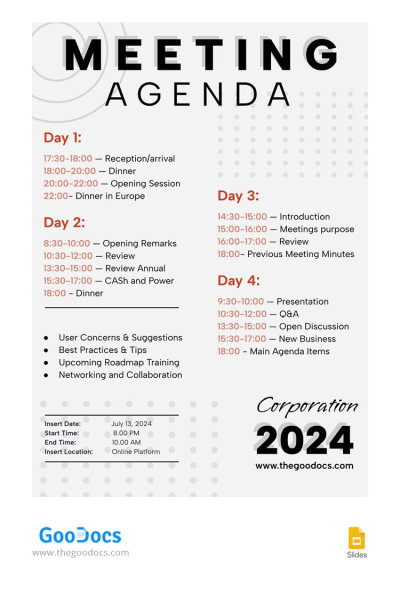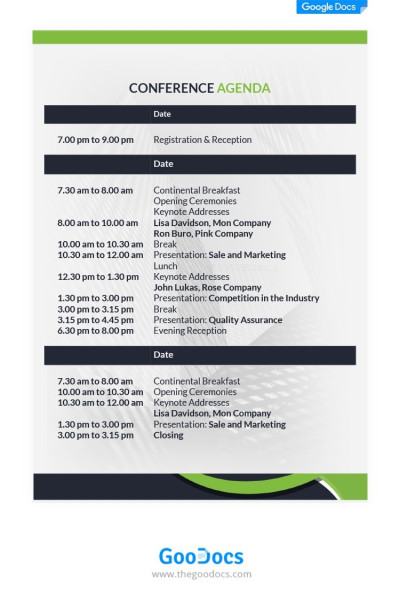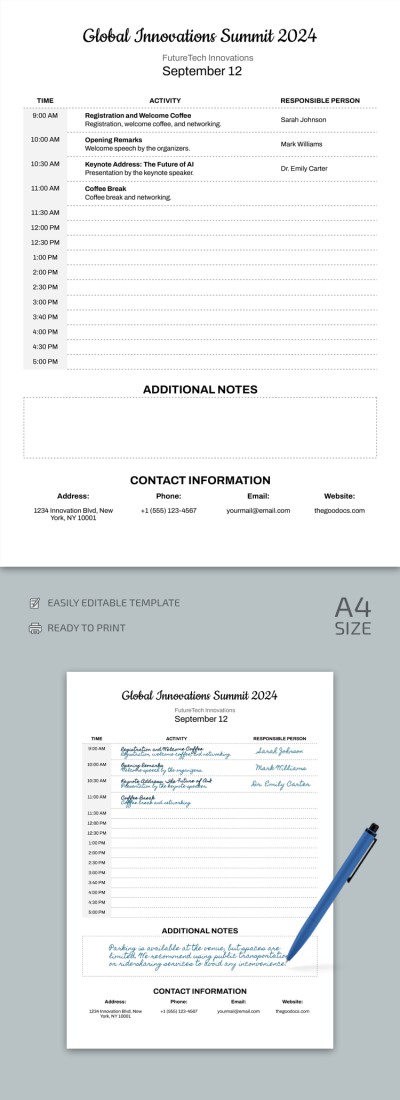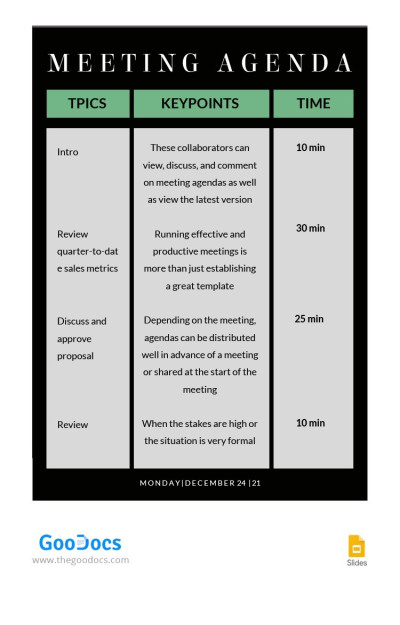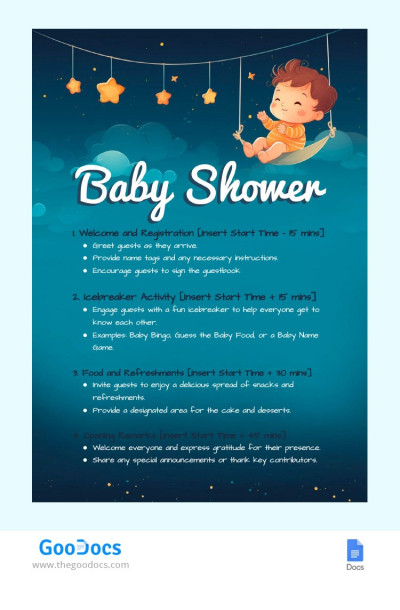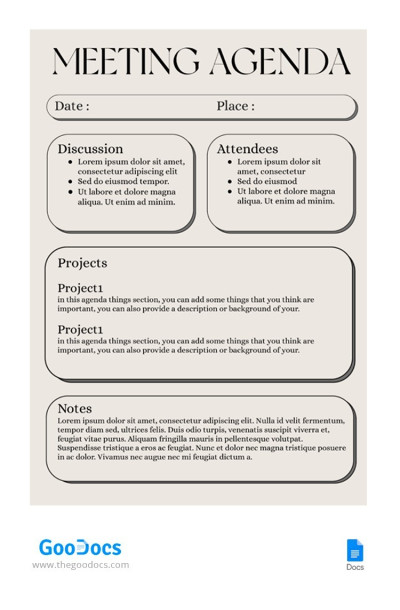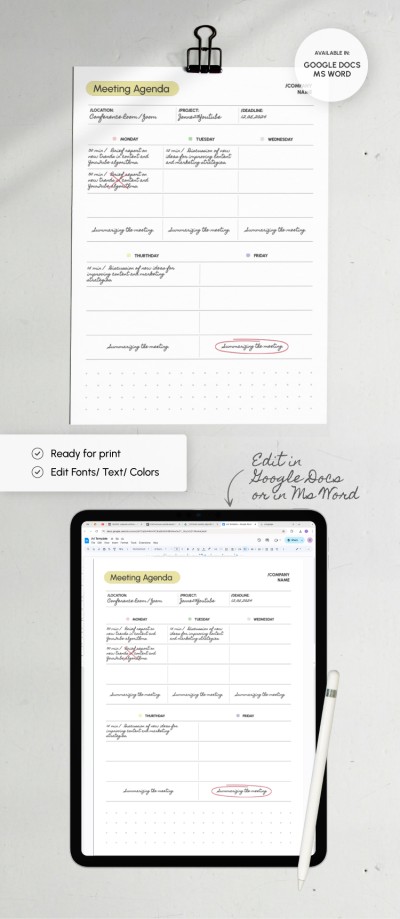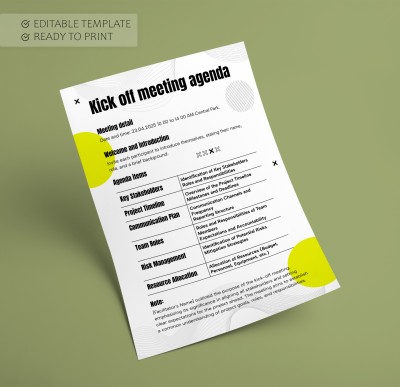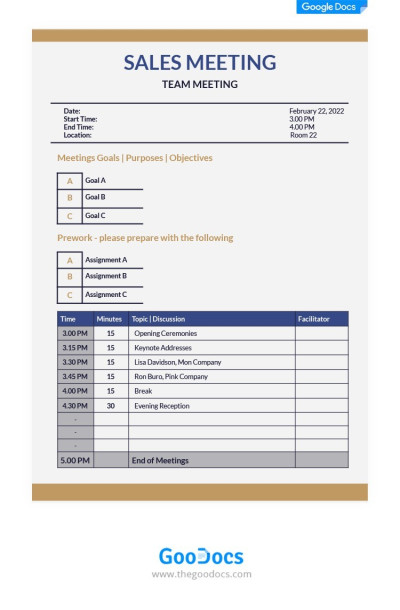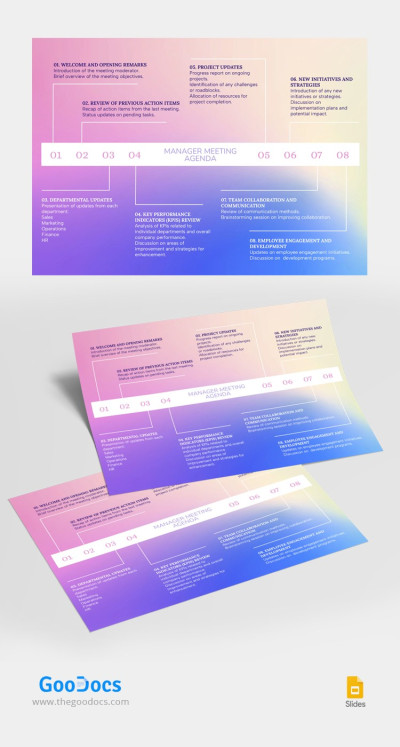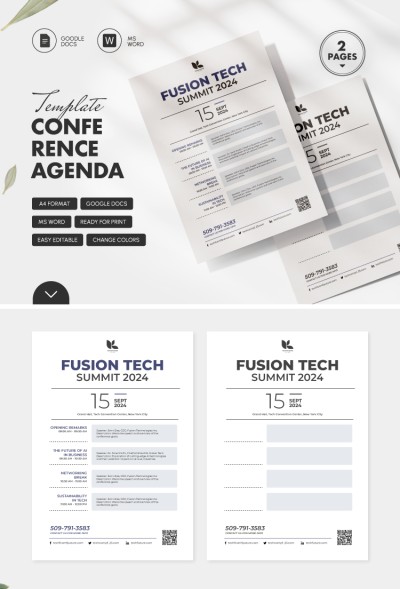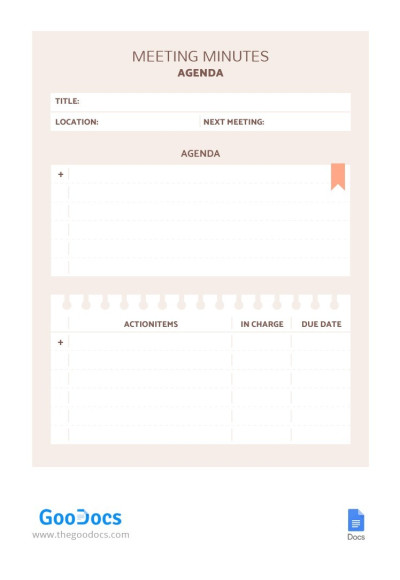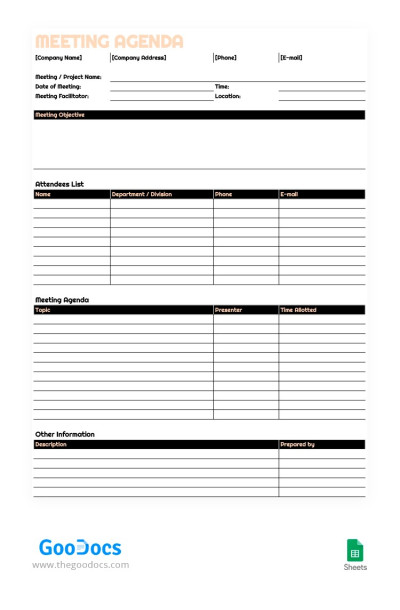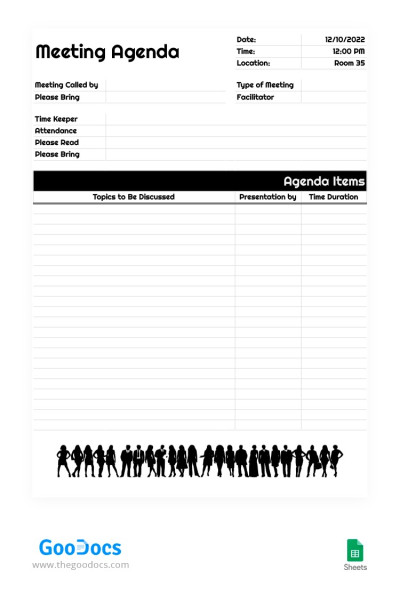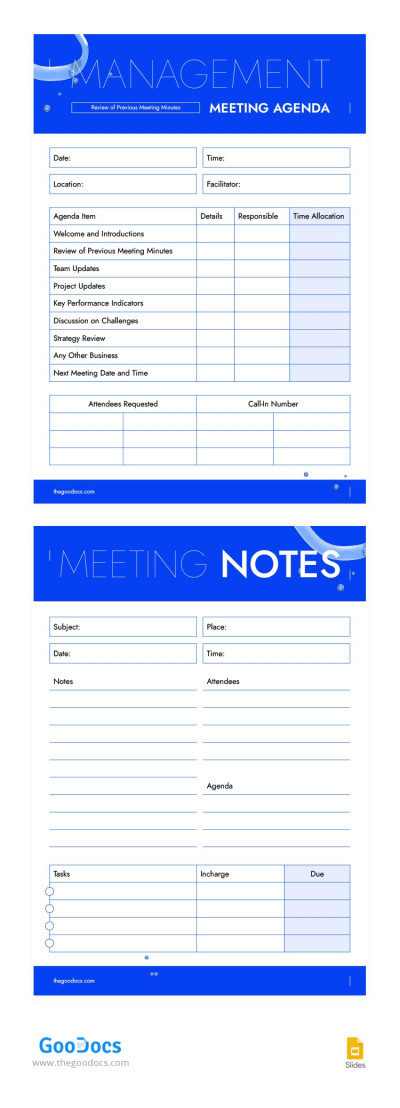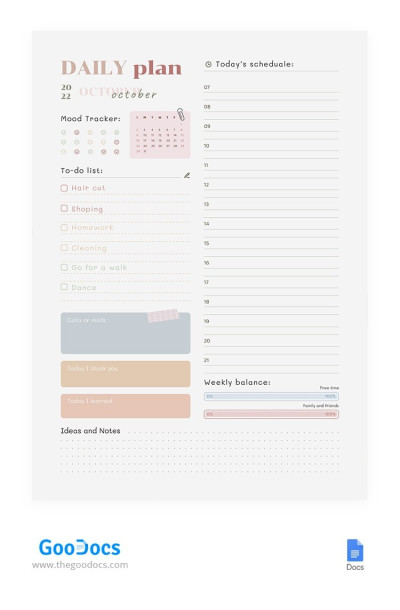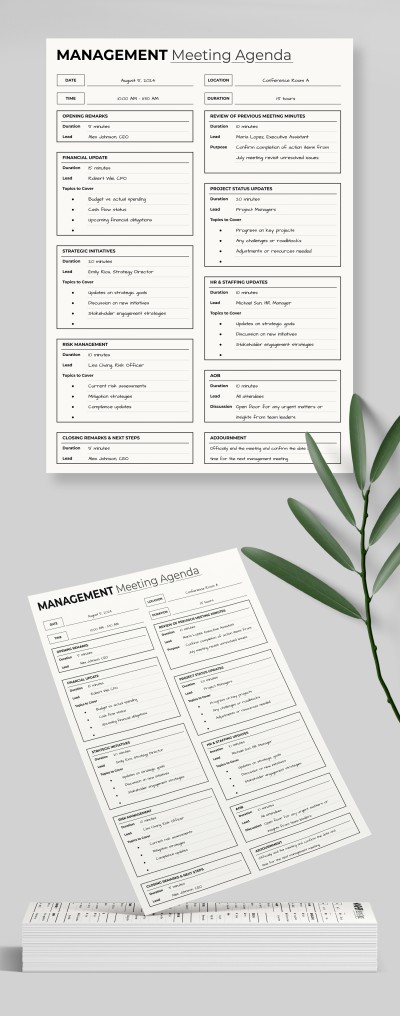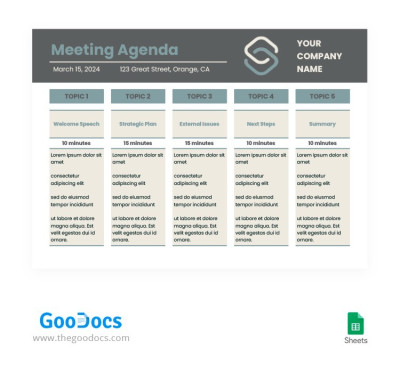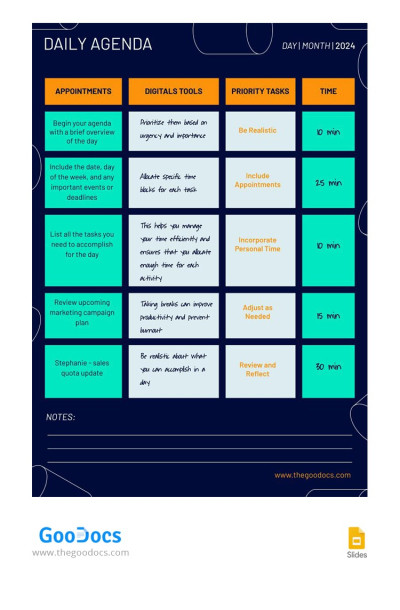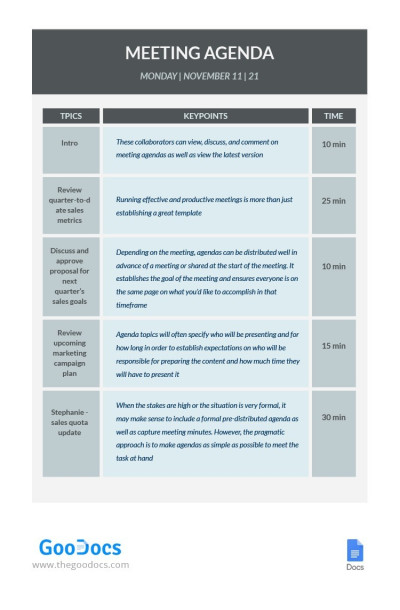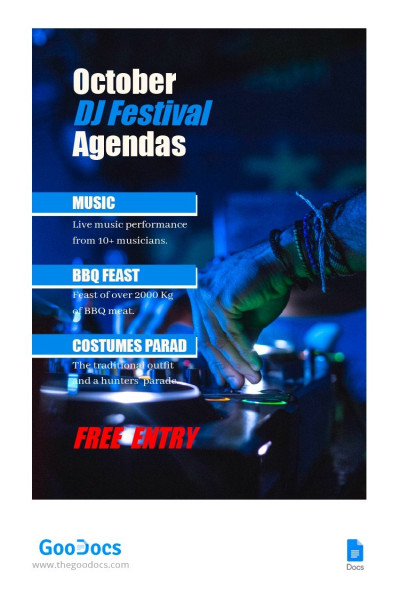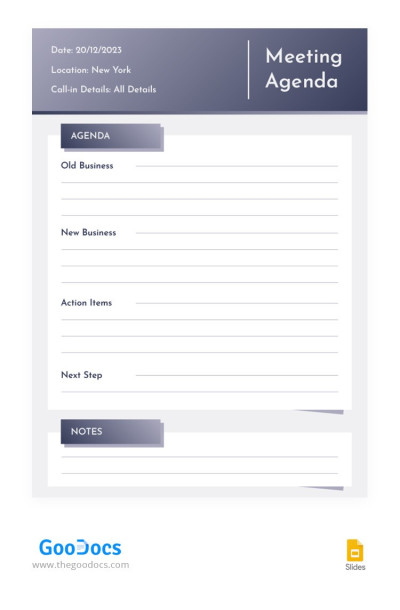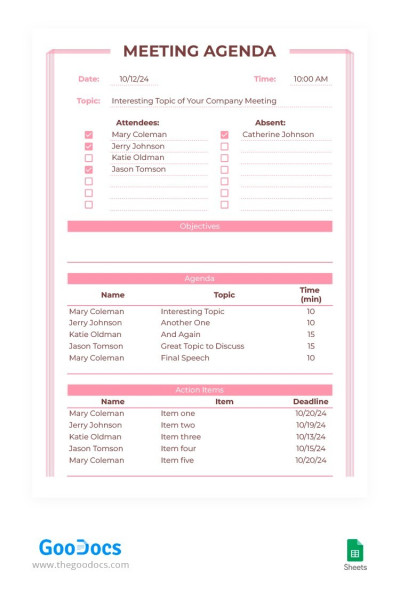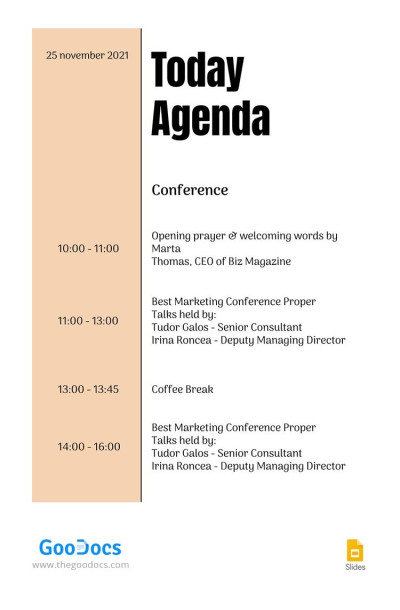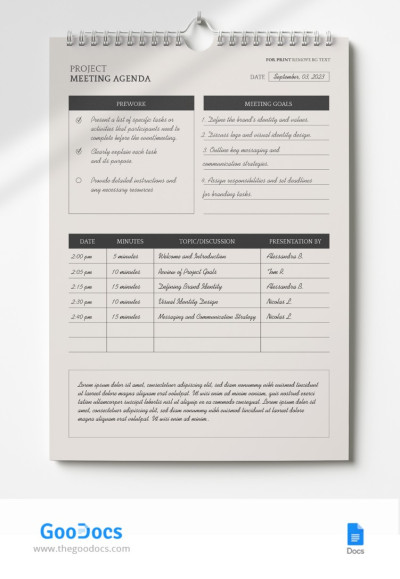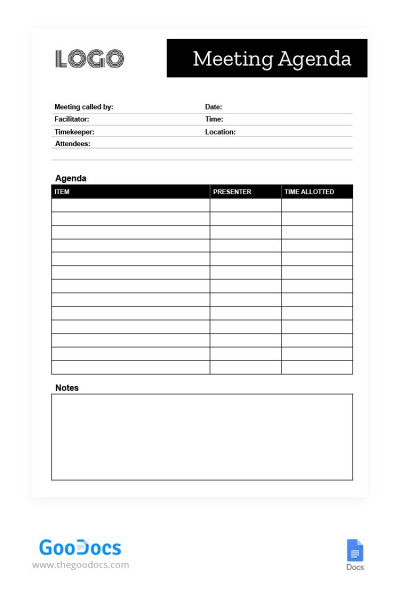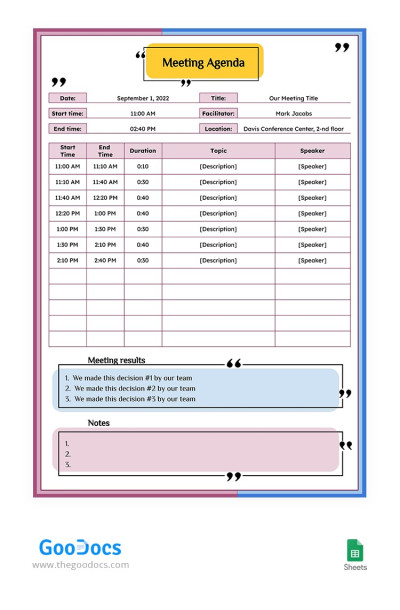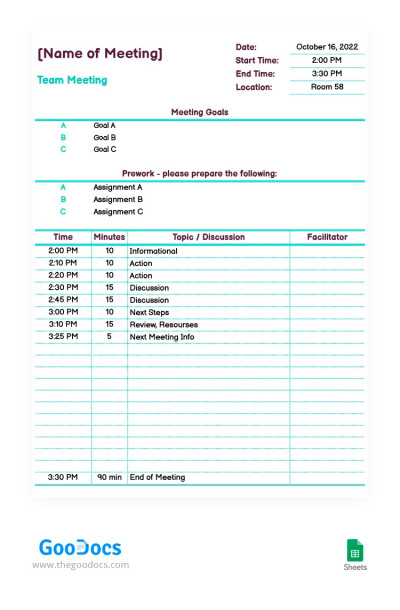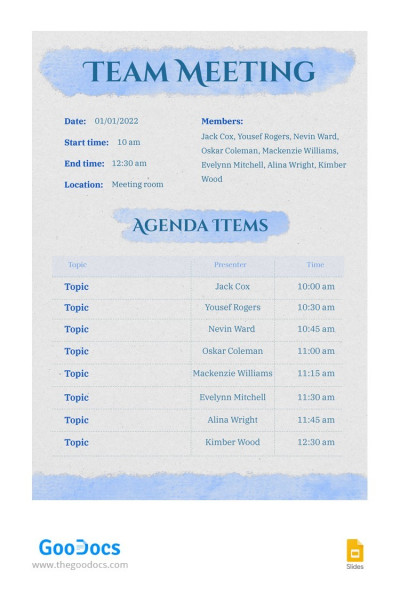Meeting Agenda Templates
Our free Meeting agenda templates in Google Docs and Microsoft Word are designed to enhance your daily, weekly, or monthly planning, also available in Excel and Google Sheets. Whether you're a professional, student, or anyone striving for productivity, we are here to offer a seamless and efficient way to structure your meetings or learning processes and stay ahead of your tasks.
Professional Team Meeting Agenda
Optimize your meeting efficiency with our Professional Team Meeting Agenda template. This no-frills approach to agenda design ensures a focused discussion.
One on One Meeting Agenda
We are introducing the elegant and practical One-on-One Meeting Agenda Template in Google Docs.
Simple Meeting Agenda
Run effective meetings at any level with our Simple Meeting Agenda Template.
Formal Weekly Agenda
This Formal Weekly Agenda template can unlock maximum efficiency in your everyday life!
Family Meeting Agenda
Organize your family discussions with clarity using our Family Meeting Agenda Template! This user-friendly and visually appealing form ensures a structured approach to your gatherings.
Board Meeting Agenda
Our Board Meeting Agenda template will help organize effective company representative discussions.
Simple Event Agenda
Our Simple Event Agenda Template is a noteworthy choice for many people and companies involved in events planning and executing.
Basic Weekly Team Meeting Agenda
Effective communication and collaboration are essential for any work-life success. One way to facilitate a productive meeting is through a weekly team meeting agenda.
Strategic Meeting Agenda
This meeting agenda template has an extravagant purple design that will let everyone know that they have come to a special event.
Staff Meeting Agenda
If you would like to transform the way you are holding team meetings, you do need a professional agenda template that promotes success and collaboration.
Minimal Workshop Agenda
Prepare to streamline your event planning process with our Minimal Workshop Agenda Template! The versatile solution from TheGoodocs can improve any gathering, from workshops to conferences and beyond.
Training Agenda
We are excited to introduce our free Training Agenda Template in Google Docs, packed with features such as a header with contact details and space for your logo, a pastel theme.
Teal Modern Nonprofit Board Meeting Agenda
We’ve made this beautiful Teal Modern Nonprofit Board Meeting Agenda template for the organization and presentation of your ideas during the meeting.
Kick Off Meeting Agenda
Welcome to our Kick Off Meeting Agenda Template which is designed with a modern corporate aesthetic and semi-formal tone.
Editable White Professional Meeting Agenda
There are many meeting agenda templates on the web. But how many convenient ones are there?
Pastel Elegant Event Agenda
What can be better than a day in SPA? Prepare the agenda for your clients and make them happy with the program you prepared for them.
Green Bright Sport Event Agenda
What's going to be on the sports festival you are organizing? Let everyone know about your plans with our beautiful agenda template.
Training Meeting Agenda
This versatile and adaptable Training Agenda template is what any company with more than ten employees needs! Training new staff members is a complex process associated with many risks.
White Professional Conference Agenda
We made the White Professional Conference Agenda template for the organization and presentation of your business conference.
Wedding Agenda
Our elegantly styled Wedding Agenda Template will help you create an announcement for your special occasion and share it with all your guests.
Sales Meeting Agenda
This sales meeting agenda template will allow you to inform everyone about the plan of the event in a clear way.
Baby Shower Agenda
Immerse yourself in the serene ambiance created by the calming shades of blue, perfectly blended with deeper tones to evoke a sense of elegance and anticipation in this Baby Shower Agenda template.
White Meeting Agenda
A well-crafted meeting agenda is a compass that steers discussions toward productivity. This Minimal Meeting Agenda Template is available on Google Docs.
Kick off Agenda
This Kickoff Agenda Template will help you organize and conduct your team kickoff meeting.
Professional Sales Meeting Agenda
Going to have a big sale meeting? Our sales meeting agenda template will help you to make everyone at the event feel welcome.
Manager Meeting Agenda
Get a simple, convenient, and modern Manager Meeting Agenda template within our platform!
Bright Event Agenda
Set the stage for unforgettable events with our Event Agenda Template. This sample is tailored for precision and ensures keeping your event on schedule and your audience thoroughly engaged.
Stylish Meeting Agenda
Introducing our Pastel Simple Meeting Agenda template. This is an efficient solution to maintain your meetings with ease.
White Simple Meeting Agenda
If you're looking for a simple meeting agenda template to promote your team's success and collaboration, welcome to check out this White Minimalist Meeting Agenda in Google Sheets.
Black and White Elegant Formal Meeting Agenda
We are happy to present you our totally new creation - Elegant Black Meeting Agenda Template. We usually say that a black-and-white design is boring. But this is certainly not the case.
Modern Management Meeting Agenda
Effective meetings at any time were the cornerstone of success.
Printable White Simple Daily Agenda
Do you find pleasure in planning your day and ticking off tasks as you accomplish them?
Gray Modern Business Meeting Agenda
We are glad to introduce you to our modern printable meeting agenda to transform your meetings into a new valuable business journey!
Stylish Daily Agenda
The Stylish Daily Agenda template is characterized by its captivating combination of green and grey structural boxes set against a dark background.
White Simple Sales Meeting Agenda
Introducing the White Simple Sales Meeting Agenda template for Google Docs! This is a tool that helps to improve the efficiency of your sales meetings.
Blue Glow Event Agenda
It's hard to show the fantastic atmosphere of a long music festival in one picture but our designers did their best. Thanks to their efforts, you can edit and download this amazing agenda template.
Gray Simple Meeting Agenda
Introducing the Gray Stylish Meeting Agenda Template. This is a solution for professionals who want to achieve the best approach to organizing their meetings.
Pink Creative Meeting Agenda
Discover our Pink Creative Meeting Agenda Template in Google Docs! A unique combination of pink borders and the same color palette makes this tool efficient and creative!
White Basic Conference Agenda
Are you ready to unleash the potential of your corporate event? Our White Basic Conference Agenda Template on Google Slides is your go-to choice.
Editable White Minimalist Meeting Agenda
Our Editable White Minimalist Meeting Agenda template is a solution that streamlines your meeting preparation and documentation.
White Professional Meeting Agenda
Are you in search of a simple meeting agenda template that promotes organization and productivity in your daily meetings? Look no further than the White Professional Meeting Agenda in Google Docs.
Multicolor Team Meeting Agenda
Introducing our Multicolor Exclusive Team Meeting Agenda template for Google Sheets. With this tool, you can elevate your formal meetings to new heights.
Minimalist Team Meeting Agenda
We congratulate you! Today you have found one of the most functional and amazing team meeting agenda templates for your business sessions!
Team Meeting Agenda
Introducing this Blue Watercolor Team Meeting Agenda in Google Slides! This is a tool that helps to improve the efficiency of your sales meetings, formal discussions, or board meetings.
- 1
- 2

